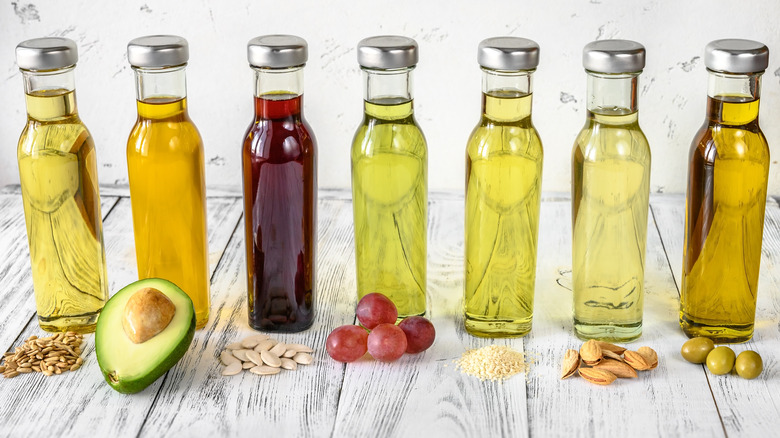What Is Oil Pulling And Does It Really Help Your Teeth?
Oil pulling is a trendy topic in the oral hygiene space. While it's gaining popularity, this practice is age-old and most notably used in the traditional Indian medicine, Ayurveda. The premise of oil pulling is simple: you vigorously swish oil around your mouth to kill bacteria and support oral health (via The Healthy). Studies indicate the mouth can contain up to 350 strains of bacteria at a time, and some of these strains can be harmful to oral health (via Healthline). In particular, some strains are linked to bad breath, cavities, inflammation, and more (via Healthline). How does oil pulling help your teeth?
For starters, oil pulling is thought to be a cavity fighter. According to research published in the Journal of Contemporary Dental Practices in 2016, swishing oil is just as effective as mouthwash at reducing the bad bacteria stored in saliva, which can lead to cavities and tooth decay. Also known as halitosis, a 2013 study published in the Journal of Natural Science, Biology and Medicine explained that around 50% of the population experiences bad breath. One 2011 study published in the Journal of Indian Society of Pedodontics and Preventive Dentistry indicated that oil pulling can improve bad breath, but more research is needed to confirm this. Additionally, it may increase mouth moisture, remove plaque build-up, and help with gingivitis, per The Healthy.
Which oil is best for oil pulling?
There are several oils that are ideal for oil pulling, but the most popular is coconut oil. Supporters of this oil claim it's high in antioxidants, anti-inflammatory, and has antimicrobial properties from the lauric acid, per a 2019 study published in the journal Cell Transportation. Coconut oil also has a mild taste and it's easy to find at grocery stores.
Even though coconut oil pulling is by far the most common, dentist Mark Burhenne points out that sesame or olive oil can work just as well (via The Healthy). According to Healthline, using sesame oil is part of a more traditional pulling method, whereas olive oil possesses anti-inflammatory properties that are similar to coconut oil. However, when it comes to fighting the severity of gingivitis, research published in the Journal of Natural Science, Biology, and Medicine in 2018 suggests that coconut oil is more effective than sesame oil.
For proper oil pulling, Burhenne suggests oil pulling for at least three to five minutes to help balance the pH of your mouth (via The Healthy). Eventually, work up to 15 to 20 minutes, making sure not to swallow any oil, as there will be a lot of gunk in it (per Healthline). Spit into the trash or sink, and then rinse your mouth with water. Keep in mind that this doesn't replace brushing your teeth (per The Healthy).

